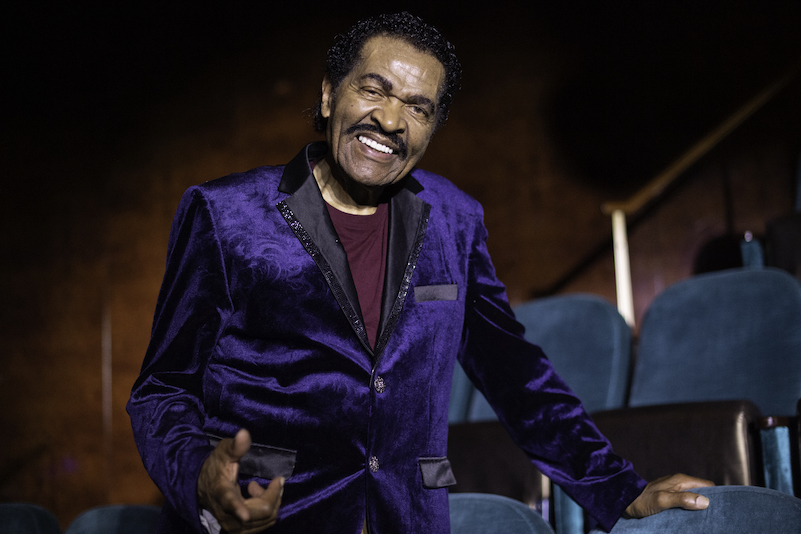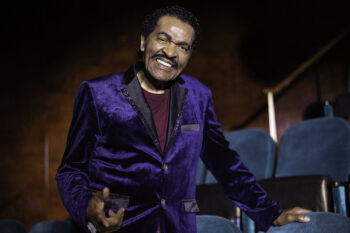

During his renowned stage show BOBBY RUSH frequently jumps high into the air, arms spread and legs tucked, only to land gracefully and return without a hitch to his dazzling routine. It’s a move you might expect at a contemporary R&B show, but it’s downright shocking when you realize that Rush is in his late 80s.
“I never thought I would be here this long,” says Rush. “I was 83 years old before I won a Grammy, but it’s better late than never. I laugh about it, but I’m so blessed and I surely never thought I’d be making a living doing what I’m doing. I’m not just an old guy on my way out.”
Hardly. Rush’s busy schedule includes headlining European festivals with his band and solo programs at venues including Jazz at Lincoln Center, and he just recorded an album of brand new material, All My Love For You, coming out via his own label Deep Rush Records in collaboration with Nashville-based Thirty Tigers. Over the last several years he’s won a second Grammy, re-recorded his 1971 hit Chicken Heads together with his old friend Buddy Guy and young blues star Christone “Kingfish” Ingram, and written a critically acclaimed autobiography, I Ain’t Studdin’ You: My American Blues Story.
The blues, Rush recalls, provided “an escape from the cotton fields. You’d go out on Saturday night to the juke joints, but then on Monday morning you’d go back into the cotton fields to work for your bossman.”
He left behind farm work to perform on the road with the Rabbit Foot Minstrels, and as “Bobby Rush”—a name he took on out of respect to his father, a minister—he toured the jukes and clubs of Louisiana, Arkansas and Mississippi before settling in Chicago in the 1950s. Through singles on labels including Chess, ABC and Philadelphia International and relentless touring Rush established an unparalleled reputation as an entertainer, which later led to him being crowned by Rolling Stone magazine as King of the Chitlin’ Circuit, the network of African American clubs that arose during the segregation era.
Based in Jackson, Mississippi since the early ‘80s, Rush began “crossing over” to new audiences several decades ago, featured in the Martin Scorsese-produced documentary The Road to Memphis, appearing alongside Terrence Howard, Snoop Dogg and Mavis Staples in the documentary Take Me to the River, and performing on the Tonight Show Starring Jimmy Fallon along with Dan Aykroyd. And the eternally youthful Rush was even able to play himself in the 1970s in Netflix’s 2019 hit biopic Dolemite is My Name in a scene with Eddie Murphy. And the recognition keeps coming. In addition to his two Grammy wins (and six nominations), he’s in the Blues Hall of Fame, has won 16 Blues Music Awards (among 56 nominations), and there’s currently a musical in development called Slippin’ Through The Cracks with sights on Broadway, recently co-written by Rush and playwright Stephen Lloyd Helper, who co-wrote the 7x Tony- nominated musical Smokey Joe’s Café celebrating the songs of Lieber and Stoller.
Rush, meanwhile, still remains steadfastly committed to the African American audiences who sustained him for decades, and on his new album he looks back from his current vantage point as a seasoned artist celebrated by an ever-growing fan base.
“I put together all these songs when I was down with the COVID, thinking about where I was going to go from here. You’ll find everything about me inside these songs—folk funk, traditional blues, ballads, love, a comedy and a shit-talking. I don’t know if it hurts me, but my head just won’t let me be still.”
“The first song is, ‘I’m free, look at me. I’ve got the shackles off my feet and the chains off my mind.’ As a blues singer, as a Black man, there were a lot of places I could not go, a lot of things I could not do. But now I’m a free man, I can do some things I never did before and talk about some things I couldn’t talk about.”
In the romping autobiographical ‘I’m the One’ Rush celebrates his long history, including learned from B.B. King and Muddy Waters after arriving in Chicago in 1952. But he was always one to carve is own path, and relays here the challenges in his ultimately successful efforts to “bring the funk into the blues.”
“Back in the day it was hard for me to convince people about recording ‘Chicken Heads’ with that kind of beat—there was none of my peers cutting that kind of record. It was too funky.”
Most of the album finds Rush with new takes on the foibles of romance, addressing the sort of morality tales that he often acts out on stage with the help of his voluptuous dancers. Many of his songs over the years, such as “What’s Good For the Goose (Is Good For the Gander Too),” have drawn from the well of African American folklore, as does the first single off his new album, which revisits a classic that was recently covered by a young star of Southern Soul.
“King George had a record out called “Keep On Rollin,” and that really comes from a record I did 28 years ago called “One Monkey Don’t Stop No Show,” which was about woman who said she was going to leave me. So I now have a single, “One Monkey Can Stop a Show”—I’m going to treat her better so she sticks around.”
Rush advocates body positivity in celebrating his “TV Mama” ‘with the big wide screen,’ and in “I’ll Do Anything For You” proclaims that he’ll serve as his lover’s chauffer and masseuse, sleep out in the rain, and even rescue her from the jungle.
“I joke and talk about sex in a way that people can understand. I’m all for lifting it up, because if it wasn’t for sex, none of us would be here. That’s what the world is built around, making love and making money. I’m in the position now that I can tell the story better than most people, and plus I’ve got nothing to lose now.”
Rush has become one of the most prominent advocates for the blues tradition, and says “it’s the root of all music, it’s the mother of all music. If you don’t like the blues, you probably don’t like your mama.”
And he has no plans to slow down.
“I’m still in decent health and my mind is pretty keen, and the most blessed thing is that I still have people around me who love what I do. And even if you don’t like me, you’re still going to say, “I don’t like Bobby Rush, but, damn, he’s good.’